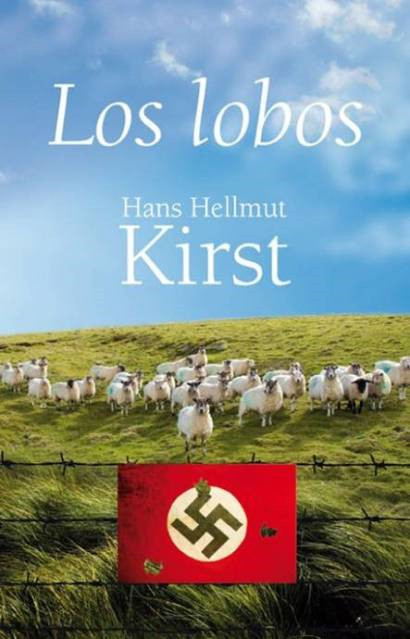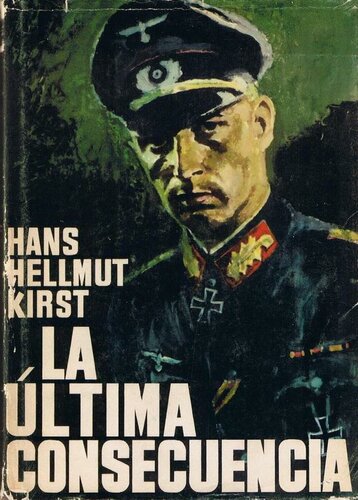oleebook.com
Los Lobos de Kirst_ Hans Hellmut
de Kirst_ Hans Hellmut - Género: Ficcion
Sinopsis
1932. Maulen, un pueblecito agrícola de Masuria, en Prusia Oriental. El granjero Alfons Materna acaba de perder a su hijo, captado por los SA, grupos de asalto del partido nazi, en unas maniobras paramilitares clandestinas. Desde ese momento sabe que todo va a cambiar en su vida pero, impertérrito, Materna ha decidido hacerle la vida imposible a los jerarcas locales del partido y, por ende, al nazismo. Con algunos aliados y con casi todo el mundo en contra, se empeña en una tozuda resistencia a base de tretas, trampas y, sobre todo, el manejo de todas las miserias personales de cada jefe local. Y así, aunque llegue el ascenso y el auge del nazismo o estalle toda una guerra mundial, impávido ante los muchos sacrifi cios que tendrá que hacer, con un objetivo final: poder ver con sus propios ojos el derrumbe de la falacia nazi. Los lobos es una mordaz radiografía del nazismo en un pequeño pueblo alemán, desde su espectacular nacimiento hasta su fatídico derrumbamiento.
Descargar
Descargar Los Lobos ePub GratisReseñas Varias sobre este libro
Segundo libro de la tetralogia "el siglo de las quimeras" Igual de bueno que el primero, mucha acción y misterio. Muy buenofantástica favourites histórica ...more4 s Béatrice1,272
Après un premier tome qui m'avait paru un peu mou, le 2° m'a complètement accrochée, l'historique se mélant astucieusement à la fiction, et même à la "fantasy" dont je ne suis pourtant pas friande ! Quelle imagination, et quelle documentation !1 Fran42 14
Nazis y brujería, excelente combinación.escritores extranjero fantasía ...more1 Elizabeth Siddal28 1 follower
I love how Gärensen's story fills the gaps that were left with David's. Let's go for the third one...
By the way, astonishing historical an anthropological documentation.1 Socrate6,695 207
Cei ce mânuiau biciul sau cu?itul erau cei mai numero?i. Birjarii cu umerii vânjo?i, o?eli?i în munca de zi cu zi, tr?gând de h??uri, sau m?celarii ?i ?elarii ale c?ror falange se îngro?aser?, fiind neîncetat încle?tate pe mânerul lamei. Urmau hamalii din gar? ?i docherii: oameni uria?i care ?tiau s? se bat? cu mâna goal? ?i al c?ror trup, c?lit de cnutul ?efilor de echip?, putea s? suporte cele mai violente lovituri. Mai erau ?i nomazii, am?râ?ii, nevoia?ii, care, într-o bun? zi î?i aruncaser? rani?a pe um?r ?i-?i târâser? trupurile usc??ive pe drumurile din provinciile învecinate, zilieri din Moldova, fo?ti pescari în marea Azov, slujba?i din ora?ul Cerkasov care-?i închipuiser? c? la cump?na dintre secole, în noul veac ce abia se înfiripa, Odesa cea puternic? se va ar?ta milostiv? fa?? de ei, dup? cum fusese fa?? de to?i ace?ti fra?i polonezi, care veniser? cu cincizeci de ani în urm?, dup? r?zboiul din Crimeea, dorind s? se bucure de condi?ii prielnice ?i s? prospere. Ana807 682
This book is about a Prussian village during WWII, and how the relationships between farmers and crafters, publican and mayor are turned inside out by the ugliness of Nazi politics, then war.
The main character is clever and good-hearted, but even he... well, I won't put any spoilers in. Suffice to say that the best, stoop to the worst.
But Kirst tells a tale of human nature and survival. And he does it very well. His description of the villagers, and the larger-than-life character of the local lord of the manor are excellent; as is the way he slowly lets out the reel of intertwined relationships.
The real heroism of the story doesn't become entirely evident until late in the novel, and even then, it is coloured with the darkness of war in Nazi Germany. I was slightly disappointed with the ending. It is difficult to articulate what disappointed me. I guess I would have d something a little more hopeful, but maybe that would have been hard to do without a Hollywood type ending. Maybe, the author intended to leave me with that vaguely dissatisfied feeling...7 s Serge83 3 Shelved as 'ww2-memories-and-side-effects'
To the excellent review by Linda I can only add: the saga of the village in East Prussia, then part of Germany, takes place over three distinct periods of history: during Hitler's takeover of power, just before the start of the Second World War, and just before the end of it. Kirst's usual style, short episodes alternating the main characters, fits the atmosphere of the novel perfectly. He shows very well the slow creep of Nazism into the minds of the population. As for the ending - too many of the characters seem converted to the good cause and the farewell speech is way too modern - but it is perfectly credible given the historic circumstances and the main character. (It is well known that the Soviet Red Army invaded what was to become part of Poland. For a good account of the "flight of the wolves" from East Prussia read "Aus Dem Dornbusch" by A.E. Johann.)1 sergevernaillen217 3
Een aanbeveling van mijn vader. Het lag al jaren in mijn kast en ben er nu maar aan begonnen.
In 3 grote delen vertelt Kirst de opgang en afgang van de nazi's en de SA in het bijzonder. Hij beperkt het verhaal tot een klein dorp in het toenmalige Oost-pruisen (ondertussen Polen).
Een goed uitgangspunt maar er stak me toch één en ander tegen. De taal kwam nogal verouderd en oubollig over. Het origineel is geschreven in 1967, de vertaling dateert van 1979.
Hier en daar werd er te veel uitgeweid en lag het leestempo nogal laag en ik vond de uitwerking van het verhaal ook niet echt waaw.
Maar ik heb wel weer één en ander bijgeleerd.
En ik vond het wel raar een boek te lezen van iemand die zelf actief was in het Duitse leger, lid was van de Nazi-partij en meevocht aan het Oostfront en dan nadien bekendheid verwierf door boeken te schrijven waarin hij de nazi's aan de kaak stelt.
Ashley Roeder16
I had to read this for a class of mine; a Film class, where we had to decide what scenes (if any) would translate well into film. I cannot say enough how much I thoroughly disd this book! There's far too many characters for 400 pages. The dialogue is choppy at best. There's absolutely no real action in this book. Any time you think you are starting to become interested, the chapter ends and never picks back up in the same spot. THIS WAS ONE OF THE WORST BOOKS I'VE READ IN MY LIFE!! Olga Lipi?ska13
zastosuj? metafor? kulinarn? - ta ksi??ka, to jest chleb i wino. albo lepiej, chleb z oliw? i wino. to jest wszystko, czego potrzeba. podstawa.
polecam.
chocia? nie ka?demu podpasuje. chleb jest suchy, wino wytrawne. ale po kilku rozdzia?ach mo?na si? w tym rozsmakowa?.audiobook Graham Senders159 1 follower
I was surprised at some of the directions that this story took. Which is a good thing. I guess it had to end when it did and in the way that it did. Juan Ramón3
Mi primer libro, humor y buena ambientación en un pequeño pueblo alemán, tanto en el inicio, como progreso y final de la época nazi. Bart?omiej2
Autor del comentario:
=================================
This book is about a Prussian village during WWII, and how the relationships between farmers and crafters, publican and mayor are turned inside out by the ugliness of Nazi politics, then war.
The main character is clever and good-hearted, but even he... well, I won't put any spoilers in. Suffice to say that the best, stoop to the worst.
But Kirst tells a tale of human nature and survival. And he does it very well. His description of the villagers, and the larger-than-life character of the local lord of the manor are excellent; as is the way he slowly lets out the reel of intertwined relationships.
The real heroism of the story doesn't become entirely evident until late in the novel, and even then, it is coloured with the darkness of war in Nazi Germany. I was slightly disappointed with the ending. It is difficult to articulate what disappointed me. I guess I would have d something a little more hopeful, but maybe that would have been hard to do without a Hollywood type ending. Maybe, the author intended to leave me with that vaguely dissatisfied feeling...7 s Serge83 3 Shelved as 'ww2-memories-and-side-effects'
To the excellent review by Linda I can only add: the saga of the village in East Prussia, then part of Germany, takes place over three distinct periods of history: during Hitler's takeover of power, just before the start of the Second World War, and just before the end of it. Kirst's usual style, short episodes alternating the main characters, fits the atmosphere of the novel perfectly. He shows very well the slow creep of Nazism into the minds of the population. As for the ending - too many of the characters seem converted to the good cause and the farewell speech is way too modern - but it is perfectly credible given the historic circumstances and the main character. (It is well known that the Soviet Red Army invaded what was to become part of Poland. For a good account of the "flight of the wolves" from East Prussia read "Aus Dem Dornbusch" by A.E. Johann.)1 sergevernaillen217 3
Een aanbeveling van mijn vader. Het lag al jaren in mijn kast en ben er nu maar aan begonnen.
In 3 grote delen vertelt Kirst de opgang en afgang van de nazi's en de SA in het bijzonder. Hij beperkt het verhaal tot een klein dorp in het toenmalige Oost-pruisen (ondertussen Polen).
Een goed uitgangspunt maar er stak me toch één en ander tegen. De taal kwam nogal verouderd en oubollig over. Het origineel is geschreven in 1967, de vertaling dateert van 1979.
Hier en daar werd er te veel uitgeweid en lag het leestempo nogal laag en ik vond de uitwerking van het verhaal ook niet echt waaw.
Maar ik heb wel weer één en ander bijgeleerd.
En ik vond het wel raar een boek te lezen van iemand die zelf actief was in het Duitse leger, lid was van de Nazi-partij en meevocht aan het Oostfront en dan nadien bekendheid verwierf door boeken te schrijven waarin hij de nazi's aan de kaak stelt.
Ashley Roeder16
I had to read this for a class of mine; a Film class, where we had to decide what scenes (if any) would translate well into film. I cannot say enough how much I thoroughly disd this book! There's far too many characters for 400 pages. The dialogue is choppy at best. There's absolutely no real action in this book. Any time you think you are starting to become interested, the chapter ends and never picks back up in the same spot. THIS WAS ONE OF THE WORST BOOKS I'VE READ IN MY LIFE!! Olga Lipi?ska13
zastosuj? metafor? kulinarn? - ta ksi??ka, to jest chleb i wino. albo lepiej, chleb z oliw? i wino. to jest wszystko, czego potrzeba. podstawa.
polecam.
chocia? nie ka?demu podpasuje. chleb jest suchy, wino wytrawne. ale po kilku rozdzia?ach mo?na si? w tym rozsmakowa?.audiobook Graham Senders159 1 follower
I was surprised at some of the directions that this story took. Which is a good thing. I guess it had to end when it did and in the way that it did. Juan Ramón3
Mi primer libro, humor y buena ambientación en un pequeño pueblo alemán, tanto en el inicio, como progreso y final de la época nazi. Bart?omiej2
Autor del comentario:
=================================
